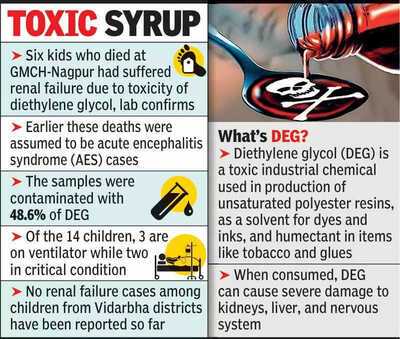NAGPUR: At least 14 more children from Madhya Pradesh 's Chhindwara district who had been administered the now-banned cough syrup Coldrif are battling for life in government and private hospitals in Nagpur after suffering renal failure .
Lab reports confirmed the six children who died at GMCH-Nagpur had suffered renal failure due to diethylene glycol (DEG) toxicity. Syrup samples were found to be contaminated with 48.6% DEG, a toxic substance used as antifreeze and in brake fluids. Initially, these deaths were assumed to be cases of acute encephalitis syndrome (AES), but zero urine output in patients with a history of cough and fever raised alarm among govt doctors.
Nagpur municipal corporation is set to issue guidelines to all medical practitioners, advising them not to prescribe cough syrups, especially to children below five years.
On Sunday, Maharashtra government banned Coldrif, manufactured by Sresan Pharma in Tamil Nadu's Kancheepuram. Head of GMCH's paediatrics department, Dr Manish Tiwari, said three children remain on ventilator support while two are in critical condition.

Deputy director of health services Dr Shashikant Shambharkar said 14 children are currently admitted to govt and private hospitals in Nagpur. "We have instructed all public health hospitals in Nagpur, spanning six districts, not to prescribe this syrup. However, none of our hospitals had any supply or stock of Coldrif. No renal failure cases among children from Nagpur or Vidarbha districts have been reported. We only have sporadic AES cases from some Vidarbha districts, but they are not related to cough syrup," he said.
Paediatric intensivist Dr Anupam Bahe, who treated six children from MP for renal failure at Nelson Hospital, said besides Coldrif, their patients were also given two other cough syrups. "Two children were administered cough syrups of different local brands. Both were later shifted to other hospitals and remain critical," he said.
NMC officials said surveillance and monitoring are still underway.
Lab reports confirmed the six children who died at GMCH-Nagpur had suffered renal failure due to diethylene glycol (DEG) toxicity. Syrup samples were found to be contaminated with 48.6% DEG, a toxic substance used as antifreeze and in brake fluids. Initially, these deaths were assumed to be cases of acute encephalitis syndrome (AES), but zero urine output in patients with a history of cough and fever raised alarm among govt doctors.
Nagpur municipal corporation is set to issue guidelines to all medical practitioners, advising them not to prescribe cough syrups, especially to children below five years.
On Sunday, Maharashtra government banned Coldrif, manufactured by Sresan Pharma in Tamil Nadu's Kancheepuram. Head of GMCH's paediatrics department, Dr Manish Tiwari, said three children remain on ventilator support while two are in critical condition.
Deputy director of health services Dr Shashikant Shambharkar said 14 children are currently admitted to govt and private hospitals in Nagpur. "We have instructed all public health hospitals in Nagpur, spanning six districts, not to prescribe this syrup. However, none of our hospitals had any supply or stock of Coldrif. No renal failure cases among children from Nagpur or Vidarbha districts have been reported. We only have sporadic AES cases from some Vidarbha districts, but they are not related to cough syrup," he said.
Paediatric intensivist Dr Anupam Bahe, who treated six children from MP for renal failure at Nelson Hospital, said besides Coldrif, their patients were also given two other cough syrups. "Two children were administered cough syrups of different local brands. Both were later shifted to other hospitals and remain critical," he said.
NMC officials said surveillance and monitoring are still underway.
You may also like

ghd Chronos straighteners get early Prime Day discount

Reece James withdraws from England squad as uncapped replacement named

Freddy Brazier practices for being a dad as he plans sweet tribute to mum Jade

Sai Sudarshan's Career on the Line in Upcoming India vs West Indies Test

Thomas Skinner returns to work hours after Strictly Come Dancing elimination






